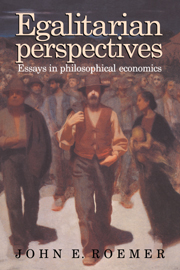Book contents
- Frontmatter
- Contents
- Acknowledgments
- List of sources
- Introduction
- Part I Exploitation
- Part II Equality of resources
- Introduction to Part II
- 6 Equality of talent
- 7 Egalitarianism, responsibility, and information
- 8 A pragmatic theory of responsibility for the egalitarian planner
- Part III Bargaining theory and justice
- Part IV Public ownership and socialism
- References
- Index
Introduction to Part II
Published online by Cambridge University Press: 23 December 2009
- Frontmatter
- Contents
- Acknowledgments
- List of sources
- Introduction
- Part I Exploitation
- Part II Equality of resources
- Introduction to Part II
- 6 Equality of talent
- 7 Egalitarianism, responsibility, and information
- 8 A pragmatic theory of responsibility for the egalitarian planner
- Part III Bargaining theory and justice
- Part IV Public ownership and socialism
- References
- Index
Summary
The Marxian concept of exploitation, I maintain, is associated with a view of justice that holds that alienable productive resources should be equally distributed (or equally available) to all people. As such, Marx's theory of exploitation is a kind of equality-of-resource theory of justice. The specific way that Marx calculated whether a person was exploited, by comparing the labor embodied in the share of national income received with the share of labor performed – what I called the unequal exchange definition in Essay 4 – renders a different verdict than the property-relations (PR) definition of exploitation gives when preferences differ across people. I concluded that, in these cases, the property-relations definition was the superior one, from an ethical viewpoint, which led me to an interest in equality-of-resource theories of justice more generally.
The most important such theories were Rawls's theory (1971) of “maximinning” primary goods and Dworkin's theory (1981a) of “equality of resources.” Dworkin's theory was both especially interesting to an economist and attractive: interesting because it proposed an actual economic mechanism for equalizing resources, and attractive because it attempted to limit the jurisdiction of the egalitarian policy to people's circumstances, while letting them remain responsible for aspects of their personal choices. (Dworkin wrote, as Essay 6 records, that the distribution of outcomes should be ambition-sensitive but not endowment-sensitive, where ‘endowment’ is identified with circumstances beyond one's control, and ‘ambition’ with self-directed choice.)
- Type
- Chapter
- Information
- Egalitarian PerspectivesEssays in Philosophical Economics, pp. 115 - 118Publisher: Cambridge University PressPrint publication year: 1994



